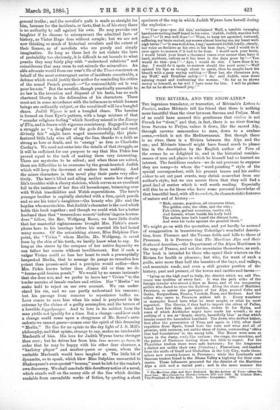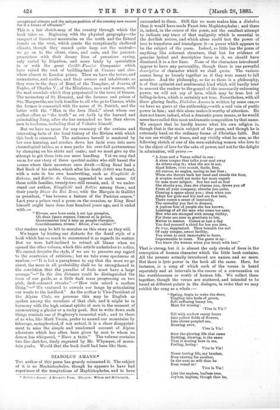THE RIVIERA, AND THE SNOW-LINE.* Tn - E ingenious translator, or travestier,
of Merimee's Letters to. Panizzi, makes Merimee tell his friend that there is nothing more beautiful than the river between Savona and Frejus. Most of us could have assured this gentleman that rivibre is not French for "river," and that, in fact, there is no river flowing from Savona to Frejus, unless it flows, like the sacred Alp,.
through caverns measureless to man, down to a sunless ocean,—which is not the Mediterranean. Bat though there is no river, there is a Riviera between the Alps and the sea; and Merimee himself might have found much to please
him in the description by the English author of Vera of the scenes he so delighted in, and in the historical reminiscences of men and places in which he himself had so learned an interest. The fastidious readers—we do not presume to suppose they are many—to whom the " word-painting " style of the special correspondent, with his present tenses and his audire videor to set out past events, may shrink somewhat from our author's style; but we can assure them that they will find a good deal of matter which is well worth reading. Especially will this be so for those who have some personal knowledge of that beautiful land, with all its cachets, its characteristic featuresof nature and of history :— " Rich, ornate, populous, all treasures thine, The golden corn, the olive, and the vine; Fair cities, gallant mansions, castles old, And forests, where beside his leafy bold The sullen boar bath heard the distant horn, And wets his tusks against the gnarled thorn."
We might go on with the quotation, and yet hardly be accused of exaggeration in transferring Coleridge's wonderful description, from Florence and the Tuscan fields and hills to those of
Provence. it is Provence that The Maritime Alps and their Seaboard describes,—the Department of the Alpes Maritimes in the map of France, and not the mountains themselves, as such. The book is intended for those who spend their winters on the Riviera for health or pleasure ; but who, for want of such a guide, miss more than half the beauties of the bays, and valleys,.
and mountain roads, and even a still greater portion of the history, past and present, of the towns and castles and farms :—
"Lying on the high road to Italy, the district which we call Provence was trodden of every foot. It was the path alike of the foreign invader who aimed a blow at Rome, and of the conquering soldier who dared to cross the Rubicon. Along the shore of Maritime Provence, or across the passages of her Alps, poured Celts and Goths, Burgundians, Franks, Vandals, Huns, and Berbers. And the tribes who came to Provence Belden) left it. Every wanderer or marauder found here what he most sought, or what ho most regretted. The Greeks, if they had to import the olives of Pallas, found here fair skies, pale marbles, violets fit for Hying, and roses of which Alcibiades might have made his wreath ; to say nothing of a sea as 'deeply, darkly, beautifully blue' as that which breaks round the Leucadian headland. The Jews, who drifted hither,. first after the persecution of Titus, and again in 1492, after their expulsion from Spain, found hero the corn and wine and oil of promise, with terraces, not unlike those of Judea, surrounding cities that had foundations' in the sunny hills. The Moors were soon at home in the dusty, wady-like ravines : the crags, the sunshine, and the palms of Provence leaving them but little to regret. For the Phcenician traders there were safe harbours; for the Aragoneso a dialect not unlike their own (Catalan) ; Florentines, red-handed from the strife of Guelf and Ghibelline in the Lily City, made themselves new country-houses in Presence; while the Lombards and Genoese traders found in the Rhone Valley a highway for their commerce. These influences procured for the distriot of the Maritime Alps a rich and a varied past ; and in the same manner the
exceptional climate and the unique position of the country now ensure for it a future of affluence."
This is a fair sketch-map of the country through which the book takes us. Beginning with the physical geography—the
rampart of limestone mountains on the north and the Esterel forests on the west, which create the exceptionally sheltered climate, though they cannot quite keep out the mistral—
we go on to the olives, vines, and corn, and the peasantproprietors with their dreary lives of penurious saving, only varied by litigation, and more lately by speculation
in or with the great Credit-Fonder Companies which have raised the cost of building-land at Cannes and else
where almost to London prices. Then we have the towns, and monasteries, and castles, and their owners and inhabitants, as they were in the days of Ren6, of the Templars, of Joanna of Naples, of Charles V., of the Mirabeaus, men and women, with the mad scandals which they perpetrated in the town of Grasse. The monastery of St. Honorat, and the fortress and prison of Ste. Marguerite, are both familiar to all who go to Cannes, while the former is connected with the name of St. Patrick, and the latter with the "Man in the Iron Mask," about whom our author offers us "the truth" as set forth by the learned and painstaking Jung, after she has unmasked no less than eleven men in buckram, including that of Voltaire himself.
But we have no space, for any summary of the curious and interesting facts of the local history of the Riviera with which this book is crammed. The authoress herself is mastered by her own learning, and crushes down her facts even into mere chronological tables, as a man packs his over-full portmanteau by stamping on his shirts and coats ; and we must give up the attempt to get them into our mere handbag. Yet we may find room for one story of those spectral nobles who still haunt the scenes where their ancestors once dwelt :—King Ren6 had a Red Book of his nobles, which after his death (1480) was found, with a note in his own handwriting, such as Simplicite de Sabran, and Sottise de Grasse, appended to each name. Of these noble families, twenty-two still remain, and, if we under stand our author, Simplicite and Sottise among them ; and their yearly Diner du Rol. Rene, with the Marquis de Gallifet as president, "has become a feature of the Parisian season." Last year a prince read a poem on the occasion, as King Rend himself might have done four hundred years ago, and it ended with:—
"Revons, mes bons amis, h cet age prosper% Oh deux epoux royanx, remoraet Is prier°, Gouvernaient tour ui tour un penple chevalier, Gentilshommes, 'trona ! Bever, c'est oublier !"
Our readers may be left to moralise on this story as they will. We began by hinting our distaste for the florid style of a book which has so much to recommend it as regards its matter. But we were half-inclined to retract all blame when 'we opened the other volume, which this article undertakes to notice.
We cannot describe the style, if we are to preserve any regard to the courtesies of criticism ; but we take some specimens at random :—" It is but a paraphrase to say that the more we go about, the more in all probability shall we be strengthened in the conviction that the paradise of fools must have a large acreage."—" In the dim distance could be distinguished the form of our guide, as a little dark mass progressing on two pink, flesh-coloured streaks."—" How ruin seized a roofless thing."—" We ventured to corrode our lungs by articulating our wants to the landlord." As the author is Vice-President of the Alpine Club, we presume this may be English as spoken among the members of that club, and it might be in harmony with the high animal spirits of men in the moment of surmounting a glacier or a rocky peak. But to write down such things reminds one of Dogberry's immortal wish ; and to those of us who, like Mark Twain, prefer to ascend our mountains by telescope, metaphorical, if not actual, it is a sheer disappointment to miss the simple and unadorned account of Alpine adventure which has often been given by men to whom no demon has whispered, "Have a taste." The volume contains two fine sketches, finely engraved by Mr. Whymper, of mountain peaks. Would that the book itself had been like them.



































 Previous page
Previous page